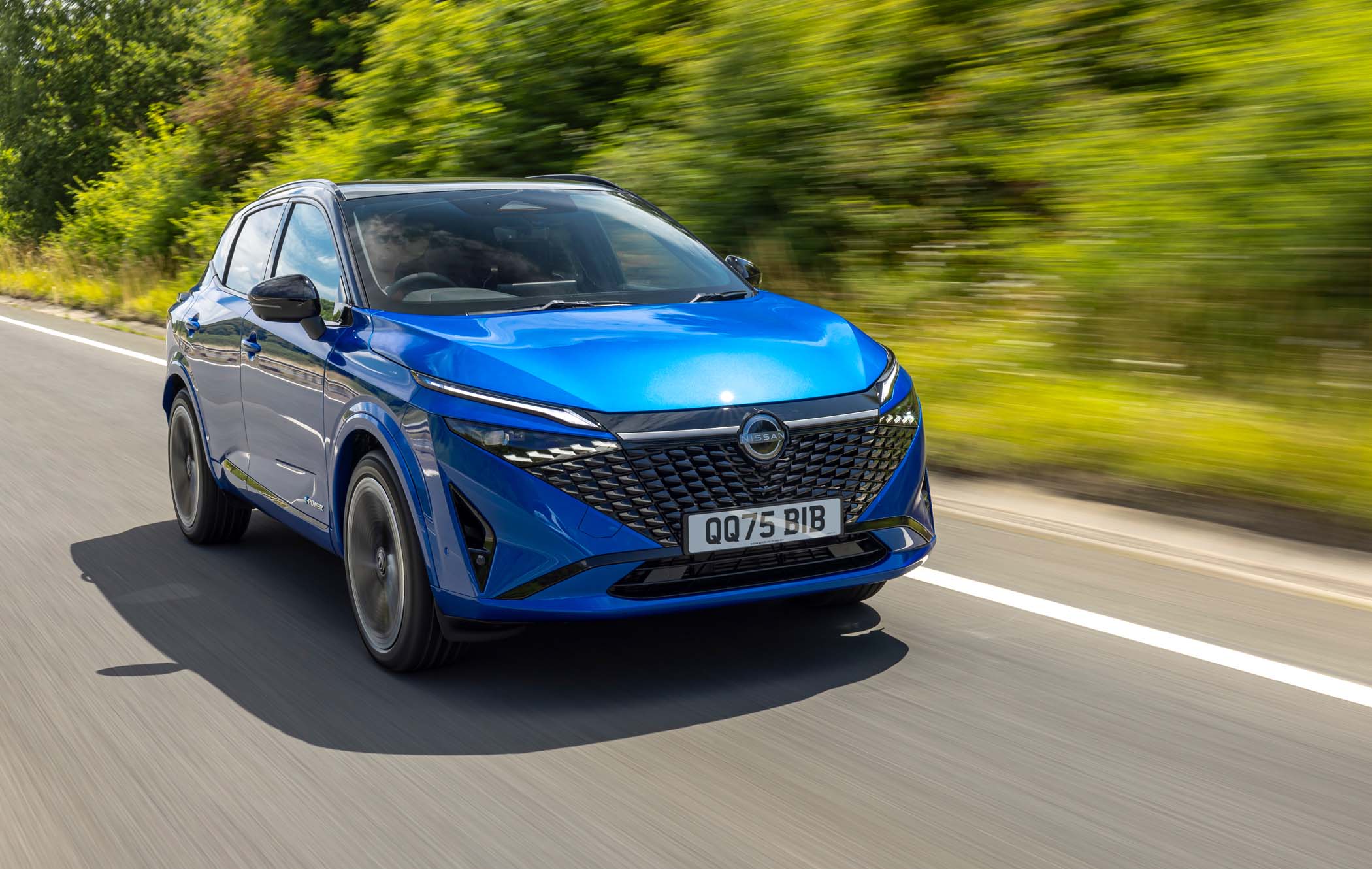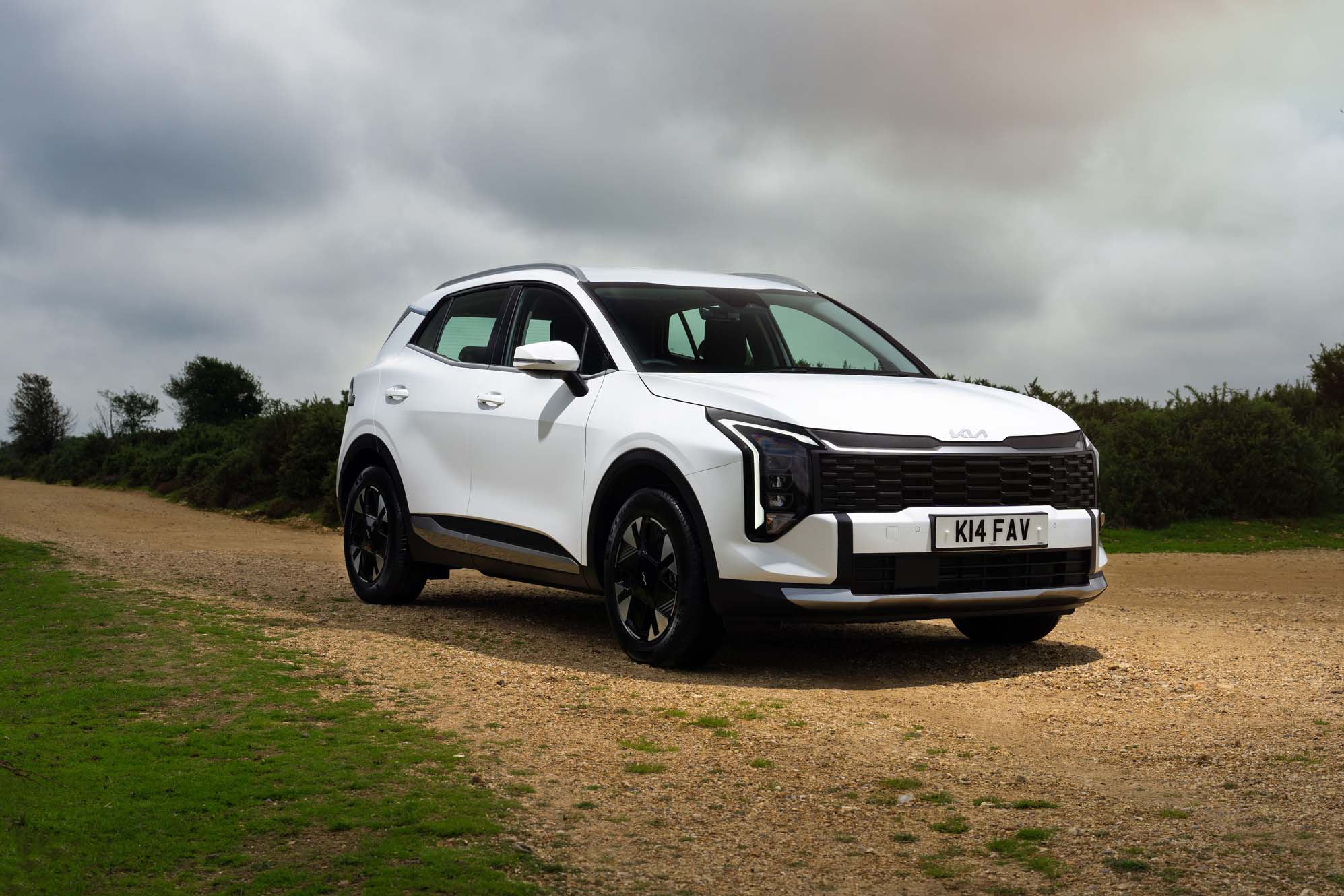Volkswagen Tiguan review
The Volkswagen Tiguan remains a standout choice in the family SUV market for its blend of practicality, comfort and gadgets, and this third-generation model reaffirms its position as the go-to for drivers up and down the UK with stacks of added technology and other improvements. There should be a Tiguan to suit all buyers, available with petrol, diesel, mild hybrid and plug-in hybrid powertrains. Read on for our road-tested Volkswagen Tiguan review.

Pros
- Impressive infotainment system
- Range of engine options
- Increased practicality
Cons
- PHEV models lose a lot of boot space
- Multifunction controller doesn’t really add much
Interior
Our rating: 8/10
Driving position
There’s a good reason the Volkswagen Tiguan is so popular for family drivers, and that’s because it’s a very versatile SUV.
Both the seat and the steering wheel offer excellent adjustability, so all drivers should be able to get comfy.
We tried a Tiguan in R-Line spec, with upgraded sporty bucket-like seats. All models have heated seats but high-spec cars like R-Line and Elegance also have massaging functionality.
Tech and features
Much like other Volkswagen models of a similar age, the Tiguan uses an infotainment display and digital instrument cluster based on the company’s fourth-generation infotainment setup.
All this means is that everything is controlled via a large and easy-to-use touchscreen infotainment system, which has a few touch-sensitive sliders beneath the screen for cabin temperature and media volume.
The Tiguan also has an upgraded head-up display compared with its predecessor – more information is now included on a projection directly to the windscreen, whereas before it was projected onto a small Plexiglass unit.
The standard Full HD 12.9-inch infotainment display is really crisp and smooth to use, but the upgraded 15-inch unit on higher-spec models really stands out on an otherwise minimal dashboard.
Volkswagen’s minimalism continues onto the centre console because the gear selector has been moved up to the steering column.
In its place is a multifunction controller which you can press in to change its function. On paper, it’s a great idea, but in reality, we mostly left it on volume control mode. The only other option is drive modes, but leaving the Tiguan in its Comfort setting is what most drivers will do.
It would be nice if the multifunction control had a few other uses, like climate control or hybrid mode changes.
Another fun system is the optional Park Assist Plus, which records the last 50 metres of driving to reply in reverse if you get stuck and need a helping hand getting out of a tight situation. It works on the screen, but also via a smartphone app which is great for showing off.
Performance
Our rating: 7/10
Engines and power
All versions of the Tiguan now come with a smooth-shifting dual-clutch automatic gearbox, and it’s the best in the business. Plug-in hybrids have six gears, while non-PHEVs have a seventh.
Thankfully, this popular family SUV still comes with diesel power, although you’ll be limited to just the one option.
It’s the same 150hp 2.0-litre unit as we’ve been getting from Volkswagen for years, and is arguably one of the better options for anybody who needs to tow, although all versions of the Tiguan are rated to pull between 1,600kg and 2,000kg.
In a similar vein, the 1.5-litre petrol engine also produces 150hp, and is slightly quicker at accelerating. It, and the lesser-powered 130hp 1.5-litre petrol, both have a clever mild hybrid system that cuts the engine out when the car’s coming to a stop.
If you’re looking for a more efficient way to get around, consider one of the 1.5-litre petrol plug-in hybrids. There are 204hp and 272hp variants, but in our experience, the 204hp model has enough poke for most people.
Handling and ride comfort
The Tiguan is a very comfortable car to ride in, and it has a composed suspension setup that does a good job of absorbing big bumps and poorly surfaced roads quite effectively.
Handling is pretty stable, but there is some lean in faster corners because of its taller posture. Plug-in hybrids have a lower centre of gravity due to the placement of their batteries, so counter this somewhat, but they can also feel a little more jarring over potholes.
Models fitted with DCC Pro have customisable control over the suspension settings, and we were genuinely surprised by how different each end of the spectrum felt. The softest setting is the most comfortable and probably the one we’d recommend.
Practicality
Our rating: 8/10
Boot space
Boot space has been improved in the third-generation model by 37 litres in non-PHEV models, up to 652 litres. Plug-in hybrids also have a little more room, but it’s capped at 490 litres because of the placement of the batteries.
It’s not all about litres, though. Volkswagen’s packaging of the boot makes the most of the space with a wide aperture and a flat floor to make loading big and bulky items easier.
Rear seats
Volkswagen claims that headroom is also up by 10mm for back-seat passengers, which is very much welcome, but it was never needed in the previous car.
We tried a model with the optional panoramic sunroof, and even behind a 5’10” driver, there was space for another 5’10” adult with ease.
Storage solutions
Front storage includes door bin space, a reasonably sized glovebox and some space under the armrest. You also get two open cupholders in the centre console.
Being a family SUV, there’s enough storage to stash away a lot of family junk, including large doorbins and seatback pockets.
Towing
Volkswagen’s official tests certify all versions can tow at least 1,600kg, which equates to a small caravan.
The 150hp petrol and the 204hp hybrid can tow 1,800kg, and the 150hp diesel and 272hp hybrid have a higher 2,000kg limit.
Safety
Euro NCAP, the independent car safety tester, is yet to get its hands on the Tiguan, but previous models scored five stars and this latest car has plenty of safety kit to continue that trend.
A handy addition is ISOFIX, adding child seat mounting tethers to the front passenger seat, as well as the two outer rear seats.
All models also have driver attention and drowsiness monitoring, a lane departure warning system and a dynamic road sign display. The mandatory speed limit warnings can be turned off with a simple shortcut at the top of the infotainment display.
Running costs
Our rating: 8/10
Fuel economy
Volkswagen’s fuel economy figures are generally pretty accurate, so we’d have no reason to doubt why you couldn’t achieve over 40mpg from the 1.5-litre mild hybrids, which return a claimed 46mpg.
The diesel will likely be more efficient on longer runs, with a claimed 52mpg figure, but the petrols’ mild hybrid system does a good job of minimising fuel usage around town.
The two plug-in hybrids have large 19.7kWh batteries, so they’re good for around 60 miles of electric-only range – slightly less than the 70+ miles the Passat can do, but that car’s lower and more aerodynamic.
Fuel economy figures exceed 700mpg, which is extremely unrealistic because of the way the motor industry runs its tests. How much fuel you use will depend entirely on whether you’re sticking to the EV-only range or if you’re doing a lot of mileage.
Reliability
The Tiguan’s reliability is average compared with its main competitors. The industry-standard three-year warranty is less than some competitors, like Hyundai and Toyota.
Some recent VWs, like the ID.3, had some software issues, but Volkswagen addressed these with free software updates. The Tiguan uses a slightly newer system, seen in the Passat, which has so far proven to be reliable.
Insurance groups
Full specifications for insurance groups are not yet confirmed, but the Tiguan will likely sit in similar insurance groups to previous models and mainstream rivals.
Expect to pay more for the more powerful models, like the 272hp hybrid, and fancier trim levels.
The verdict
Interior
8/10
Performance
7/10
Practicality
8/10
Running costs
8/10
A firm favourite among family drivers looking for a high-quality SUV without breaking the bank, the third-generation Volkswagen Tiguan retains the model’s reputation for comfort, reliability and practicality.
This is the techiest Tiguan yet, with display options up to 15 inches, gadgetry galore and a clever reversing assistant.
Most models use petrol power combined with some form of hybrid system and offer diesel-like fuel economy, but old-school SUV fans and towers still have the option of one popular diesel engine.
With its strong build quality and increased interior space, the Volkswagen Tiguan remains a solid and dependable choice to keep its regular appearance on the list of Britain’s best-selling cars.


